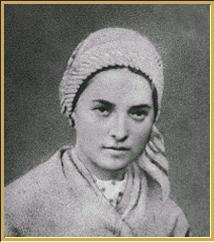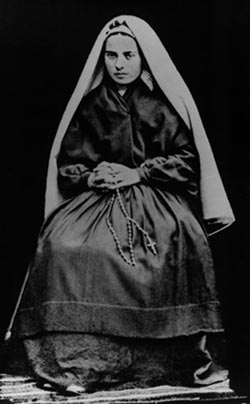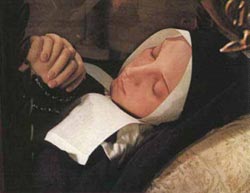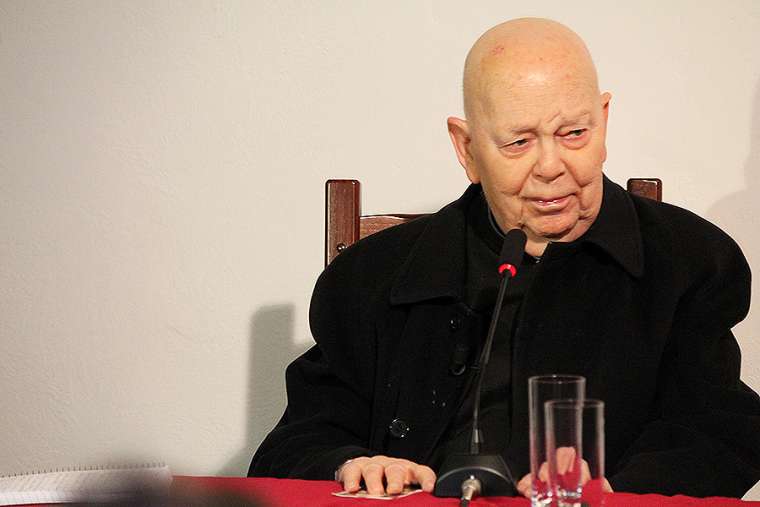Today we honor the fact that the first Pope, Peter, actually was in Rome and set the city up as the center of the new Religion; the one set up by Christ Himself. Some say that he was never there, or that Paul should have been the first pope (even though he came years later); I call them
IDIOTS!
St. Peter's Chair at Rome
from
The Liturgical Year, 1904
We are in that season of the ecclesiastical year, which is devoted to honouring the Incarnation and Birth of the Son of God, and the Maternity of the Blessed Virgin: it behoves us to remember, especially on this present Feast, that it is to the See of Peter that we owe the preservation of these dogmas, which are the very basis of our holy religion. Rome not only taught them to us when she sent us the saintly missioners who evangelised our country; but, moreover, when heresy attempted to throw its mists and clouds over these high Mysteries, it was Rome that secured the triumph to truth, by her sovereign decision. At Ephesus--when Nestorius was condemned, and the dogma, which he assailed, was solemnly proclaimed, that is, that the Divine Nature and the Human Nature, which are in Christ, make but one Person, and that Mary is consequently, the true Mother of God--the two hundred Fathers of that General Council thus spoke:--"Compelled by the Letters of our Most Holy Father Celestine, Bishop of the Roman Church, we have proceeded, in spite of our tears, to the condemnation of Nestorius." At Chalcedon--where the Church had to proclaim, against Eutyches, the distinction of the two Natures in the Incarnate Word, God and Man--the six hundred and thirty Fathers, after hearing the Letter of the Roman Pontiff, gave their decision, and said: "Peter has spoken by the mouth of Leo."
Here, then, is the privilege of Rome: to watch by Faith, over the eternal interests of mankind, as she watched previously, for long ages, and by the sword, over the temporal interests of the then known world. Let us love and reverence this City, our Mother and our Guide. Today we are called upon to celebrate her praise; let us do so with filial affection.
Sermon from St. Leo on the Feast Day of St. Peters Chair in Rome:
When the twelve holy Apostles had received from the Holy Ghost the power to speak all languages, they divided the regions of the earth among themselves as fields for their Gospel labors. Then was Peter, the Prince of the Apostles, sent to the capital city of the Roman Empire, that he might make the light to shine from the head to the whole body of the civilized nations. At that time what nation was there that had no representative in Rome? What nations would be ignorant of what Rome had learned?
Here were to be refuted the theories of philosophers, here dissolved the vanities of earthly wisdom, here overthrown the worship of devils, here destroyed the impiety of every sacrilege; here, where superstitious zeal had collected all the error and vanity of the world. Therefore to this city, O most blessed Peter thou dost not fear to come, and while thy companion in glory, the Apostle Paul, is still occupied with the government of other churches, thou dost enter this forest of savage beasts, this deep and turbulent ocean, with more boldness than when thou didst walk upon the water.
Thou hadst already taught those of the circumcision who had been converted; thou hadst founded the Church of Antioch, the first that bore the noble name of Christian; thou hadst published the law of the Gospel throughout Pontus, Galatia, Cappadocia, Asia, and Bithynia; and thou didst not fear for the difficulty of thy work, nor turn back because of thine old age, but didst boldly set up the trophy of the cross of Christ upon those Roman walls, where the Providence of God had appointed the throne of thine honor, and the glorious scene of thy passion.
(Roman Breviary)
St. Peter's Chair at Antioch by Fr. Prosper Louis P. Gueranger
We are called upon, a second time, to honour St. Peter's Chair: first, it was his Pontificate in Rome; today, it is his Episcopate at Antioch. The seven years spent by the Prince of the Apostles in the second of these cities, were the grandest glory she ever had; and they are too important a portion of the life of St. Peter to be passed by without being noticed in the Christian Cycle.
Three years had elapsed since our Lord's Ascension. The Church had already been made fruitful by martyrdom, and from Jerusalem she had spread into distant countries. Antioch, the first of the cities of Asia, had received the Gospel; and it was there, that they who professed the faith of Jesus were first called
"Christians." Jerusalem was doomed to destruction for her having not only refused to acknowledge, but also for her having crucified, the Messias: it was time for Peter, in whom resided the supreme power, to deprive the faithless City of the honour she had heretofore enjoyed, of possessing within her walls the Chair of the Apostolate. It was towards the Gentiles that the Holy Spirit drove those Clouds, which were shown to Isaias as the symbol of the holy Apostles.(Is. lx. 8.) Accordingly, it was in Antioch, the third Capital of the Roman Empire, that Peter first places the august Throne, on which, as Vice-gerent of Christ, he presides over the Church,--that new family, of which all nations are invited to become members.
But the progress of the Apostles was so rapid; the conquests they made, in spite of every opposition, were so extensive,--that the Vicar of Christ was inspired to leave Antioch, after he had honoured it with the Chair during the space of seven years. Alexandria, the second City of the Empire, is also to be made a See of Peter; and Rome, the Capital of the world, awaits the grand privilege, for which God had long been preparing her. Onwards, then, does the Prince advance, bearing with him the destinies of the Church; where he fixes his last abode, and where he dies, there will he have his Successor in his sublime dignity of Vicar of Christ. He leaves Antioch, making one of his disciples, Evodius, its Bishop. Evodius succeeds Peter as Bishop of Antioch; but that See is not to inherit the Headship of the Church, which goes whithersoever Peter goes. He sends Mark, another of his disciples, to take possession, in his name, of Alexandria; and this Church he would have he the second in the world, and though he has not ruled it in person, he raises it above that of Antioch. This done, he goes to Rome, where he permanently establishes that Chair, on which he will live, and teach, and rule, in his Successors, to the end of time.
And here we have the origin of the three great Patriarchal Sees, which were the object of so much veneration in the early ages:--the first, is Rome, which is invested with all the prerogatives of the Prince of the Apostles, which, when dying, he transmitted to her; the second, is Alexandria, which owes her pre-eminence to Peter's adopting her as his second See; the third, is Antioch, whither he repaired in person, when he left Jerusalem to bring to the Gentiles the grace of adoption. If, therefore, Antioch is below Alexandria in rank, Alexandria never enjoyed the honour granted to Antioch,--of having been governed, in person, by him whom Christ appointed to be the supreme Pastor of His Church. Nothing, then, could be more just, than that Antioch should be honoured, in that she has had the privilege of having been, for seven years, the centre of Christendom; and this is the object of today's Feast.
The Children of the Church have a right to feel a special interest in every solemnity that is kept in memory of St. Peter. The Father's Feast is a Feast for the whole family; for to him it owes its very life. If there be but one fold, it is because there is but one Shepherd. Let us, then, honour Peter's divine prerogative, to which Christianity owes its preservation; and let us often reflect upon the obligations we are under to the Apostolic See. On the Feast of the Chair at Rome, we saw how Faith is taught, and maintained, and propagated by the Mother-Church, which has inherited the promises made to Peter. Today, let us consider the Apostolic See as the sole source of the legitimate Power, whereby mankind is ruled and governed in all that concerns eternal salvation.
Our Saviour said to Peter:
"To thee will I give the Keys of the Kingdom of heaven" that is to say, of the Church. He said to him, on another occasion:
"Feed my lambs, feed my sheep." So that, Peter is Prince; for, in the language of the sacred Scriptures, Keys denote princely power: he is also Pastor, and universal Pastor; for the whole flock is comprised under the two terms, Lambs and Sheep.
Hymn to the Prince of the Apostles by
St. Peter Damian
O Prince of the Apostolic Senate! Herald of our Lord! First Pastor of the Faithful! watch over the Flock intrusted to thee.
Lead us through verdant pastures, feeding us with the nourishment of the Word; and lead us, thus fed, into the heavenly fold, whither thou hast already gone.
To thee, Peter, have been delivered the Keys of heaven's gate; and all things, both in heaven and on earth, acknowledge thy authority.
Tis thou that choosest the city where is to be established the rock of the true faith, the foundation of the building, on which the Catholic Church stands immoveable.
Thy shadow, as thou passest by, heals the sick; and Tabitha, that made garments for the poor, was raised to life at thy bidding.
Bound with two chains, thou wast set free by an Angel's power; he bids thee put on thy garments and thy sandals, and lo! the prison door is opened.
To the Father unbegotten, and to the Only-Begotten Son, and to the co-equal Spirit of them both, be praise and kingly highest power. Amen.



















